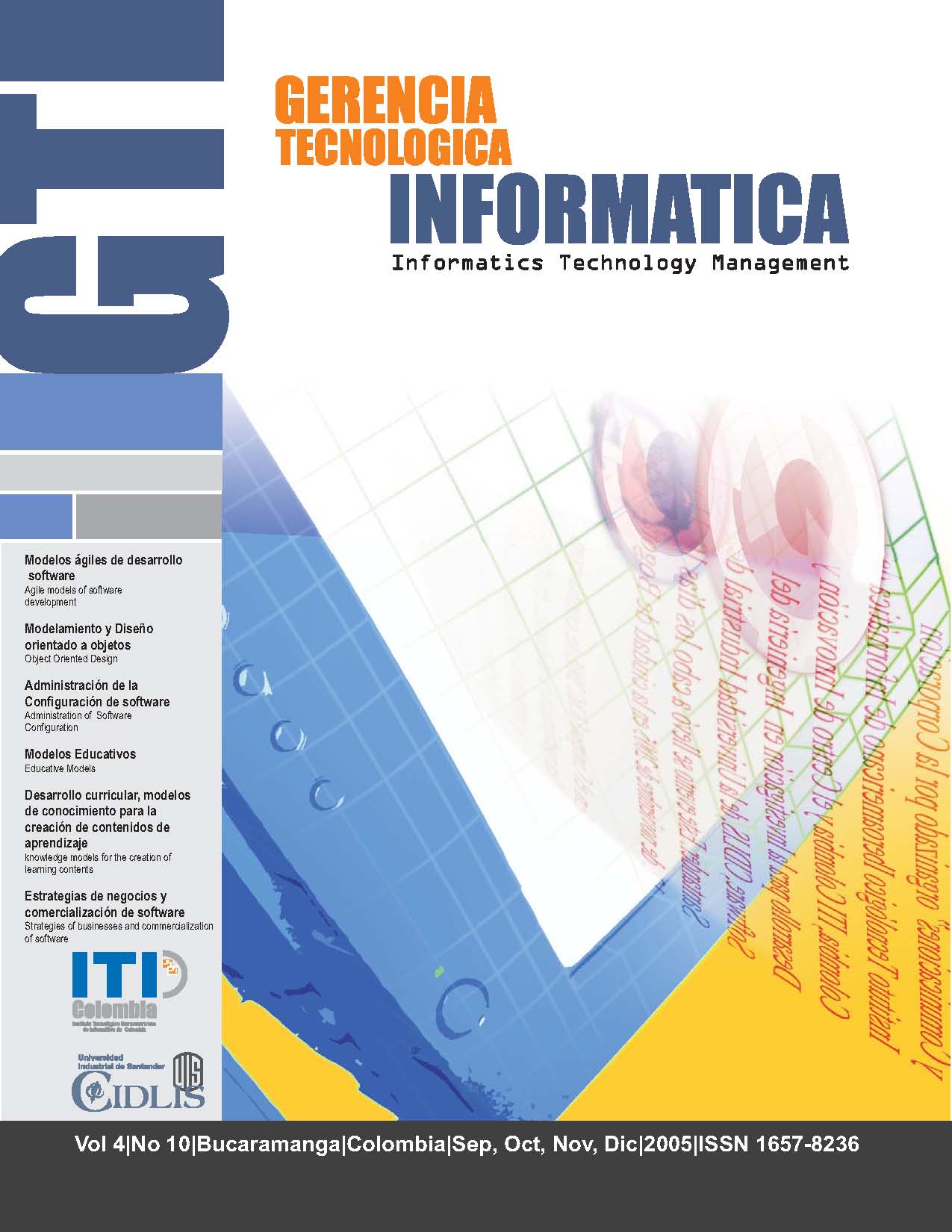Publicado 2011-04-14
Cómo citar
Resumen
RESUMEN
Actualmente, los ingenieros de software reconocen la importancia de las técnicas de Modelado Organizacional para determinar en forma precisa los requisitos de sistemas de software que den soporte efectivo a los procesos de negocio. En este contexto, el Framework i* es una de las técnicas más relevantes en modelado organizacional por su capacidad para expresar en forma explícita las relaciones sociales e intencionales entre los actores del negocio. Sin embargo, a pesar de las bien conocidas ventajas de este framework, existen ciertos factores que afectan su aplicación práctica en ambientes reales de desarrollo de software. Uno de estos factores es la carencia de un enfoque metodológico que guíe a analistas no expertos en el Framework i* en la construcción de modelos organizacionales. En este artículo se propone un método para generar modelos organizacionales a partir de estructuras de refinamiento de metas. En el método propuesto, la elicitación del contexto organizacional se realiza utilizando una estructura de metas que refleja tanto las metas generales de la organización como las operaciones de bajo nivel de los actores organizacionales. De esta forma es posible realizar la elicitación con una técnica simple e intuitiva. La estructura de metas generada será el punto de partida del proceso de generación de modelos organizacionales representados con el Framework i*.
PALABRAS CLAVES
Modelado Organizacional
Modelado de Metas
Reglas de Transformación
ABSTRACT
At present, there is a consensus in the Software Engineering Community regarding the use of organizational modeling techniques as the best way to accurately represent the requirements of software systems that give effective support to the business processes. In this context, the i* Framework has been recognized as one of the most relevant techniques for organizational modeling due to its capacity to explicitly represent the social and intentional relationships among the organizational actors. However, despite the well- nown advantages of this approach, there are certain issues that still need to be improved in order to ensure their effectiveness in real software development environments. One of this problems is the lack of a methodological approach that guides the analysts (non-experts in i*) to create the organizational models. In this paper, a methodological approach to generate i* organizational models from goals refinement structures is presented. In the proposed method, the organizational context elicitation is performed using a goal structure that represents business goals and actor's operations. This makes possible to perform the elicitation process with a simple and intuitive way. The goal structure will be the starting point for the process to generate the i* organizational models.
KEYWORDS
Organizational Modeling
Goal Modeling
Transformational Rules
Descargas
Referencias
- Alencar F., Pedroza F., Castro J., and Amorim R. New Mechanism for the Integration of Organizational Requirements and Object Oriented Modeling. Proceeding of the VI Workshop on Requirements Engineering (WER 2003). Piracicaba SP, Brasil, 2003. pp 109-123.
- Anton Annie, “Goal Based Requirements Analysis”, in Proceedings Second International Conference on Requirements Engineering. ICRE '96, pp. 136-144, April 1996.
- Bresciani P., Giorgini P., Giunchiglia F., Mylopoulos J., and Perini A., TROPOS: An Agent-Oriented Software Development Methodology. In Journal of Autonomous Agents and MultiAgent Systems, Kluwer Academic Publishers. May 2004; Volume 8, Issue 3, Pages 203 236.
- Bubenko, J. A., Jr and M. Kirikova, “Worlds in Requirements Acquisition and Modelling”, in: Information Modelling and Knowledge Bases VI. H.Kangassalo et al. (Eds.), IOS Press, pp. 159 174, Amsterdam, 1995.
- Cesare S. Mark Lycett, “Business Modelling with UML, distilling directions for future research”, Proceedings of the Information Systems Analysis and Specification (ICEIS 2002), pp. 570-579, Ciudad-Real, Spain, 2002.
- Chung, L., Nixon, B., Yu, E. and Mylopoulos,J. NonFunctional Requirements in Software Engineering. Kluwer Academic Publishers 2000.
- Dardenne, A. Van Lamsweerde and S. Fickas, “Goal Directed Requirements Acquisition,” Science of Computer Programming, vol. 20, pp. 3-50, North Holland, April 1993.
- Davide Bochini, Paolo Paolini, “Capturing Web Application Requirements through Goal-Oriented Analysis”, Proceedings of the Workshop on Requirements Engineering (WER 02), pp. 16-28, Valencia, Spain, 2002.
- Loucopoulos Pericles, Evangelia Kavakli, “Enterprise Modelling and the Teleological Approach to Requirements Engineering”, International Journal of Cooperative Information Systems (IJCIS), pp. 45-79 , 1995.
- Lamsweerde A. Goal-Oriented Requirements Engineering: A Guided Tour. Invited minitutorial, Proceeding 5th IEEE International Symposium on (RE'01), Toronto, IEEE, August 2001, pp. 249-263.
- Martínez A., Castro J., Pastor O., Estrada H. Closing the gap between Organizational Modeling and Information System Modeling. Proceeding of the VI Workshop on Requirements Engineering (WER 2003). Piracicaba SP, Brasil, 2003. pp 93-108.
- McDermid, J..A, “Software Engineer´s Reference Book”, Edit. Butterworth-Heinenmann, 1994.
- Yu, Eric, “Modelling Strategic Relationships for Process Reengineering”, PhD Thesis, University of Toronto, 1995.
